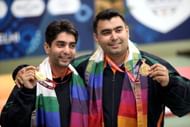It was just another evening and I was getting back from yet another long, grinding day at school. Picking up the remote, zapping channels to watch my favorite 5 pm TV show, I faintly saw a thumbnail of the tricolour flash across the TV screen. This was my second Olympics, the first one being Sydney 2000. Ironically, India’s hockey loss to Poland was my most vivid memory of Sydney, not Malleswari. Athens arrived and was passing by in what seemed like minutes, without any trace of success. In between, the 2003 ICC World Cup reinforced the thought that we were tigers in cricket and pushovers at everything else. That evening, with the schoolbag still on my back, that perception changed. And how.
I had no idea what was happening, but I waited for the graphics showing the standings to reappear on screen. Some commentator said they used to shoot live deer in this event a few decades ago. Some UFO-resembling objects flew past. I was reminded of the duck-hunt games we used to play as kids. But boy, this was at a rate of knots. And these guys kept hitting their targets. Finally, it came. Rajyavardhan Singh Rathore. Second place. The go-for-gold feeling came and went past. I never felt any signs of remorse that Rathore couldn’t make that a gold. We were recovering from a drought of almost half a century, and one silver by itself was a statement to ourselves, more than the world. A lifetime of cheering for the Maurice Greenes and the Ian Thorpes was about to give way to nationalistic pride, I thought.
Patriotism is a term loosely thrown around, especially when people use it when India wins against Sri Lanka in a bilateral series. Like Dravid said at the Bradman Oration, using “warrior” to describe both jawans and cricketers is foolish, at best. But, here was Rathore, Army colonel and all, with an olive wreath wrapped around his head, having taken India past the Bronze Age. King Rathore, the kid in me imagined.
Athletes like Anju George rekindled that spirit in what, to the average Indian, are four largely insignificant years. Insignificant, as all other sports are forgotten till the next Asian Games or the Olympics. There is a hughe hoopla when the medals tally swells at Commonwealth Games, but that wanes in comparison to the mind-space cricket occupies. I hoped, someday, our athletes would hit that nail hard on people’s heads, and change this. Like, forever.
The problem with Indian sport, like with everything else, was the lack of a well-defined structure. Want to achieve? Go abroad. Want guidance? Hire foreign coaches. At least fund us? No, just the bare minimum. Continue if you have a fat wallet. We have bigger problems to address. Seemingly, bigger problems kept coming our way. Doping scandals, gender test failures and in the near future, a huge scam.
Drawing from the last reserves left in pandora’s box, a bunch of athletes kept plugging away, without much media glare. Beijing arrived. Bolt and China made all the headlines. After Rathore, despite not much reason to, I tuned in everyday, hoping for some good news. Bindra gave that, and much more. Yes, we finally were taking baby steps! Right then, another Olympics, another medal. Time to get back to work, I thought. Vijender and Sushil woke me up from my stupor, crying out loud to the system. Like Bindra says, “We win not because of the system, but inspite of it”. His autobiography was goosebumps fare, from start to finish. Whenever I felt bad about Indian sport, I thought, I’d go through this and comfort myself.
Somewhere, another set of people were feeling the same pain, and in true un-Indian style, actually chose to do something about it. Rasquinha gave up those penalty-corner-defending-gloves and passed out of ISB. The Mittal group started taking athletes under its wings. Finally, I thought. Finally we were doing something productive. Geet Sethi and Prakash Padukone, outliers in a largely so-so period in Indian sport, were spearheading it. Leander Paes, the man who ended the drought, chipped in. Bring on London 2012, I said.
The people I felt happiest for, for once, were our sports journalists. Those columnists on magazines who kept highlighting the few athletes who were on the ascent. Ideas kept flowing for years together, only to fall on deaf ears. London then came. Gagan Narang finally took luck with him to an Olympics, and started things off. India was waking up to yet another Olympics. Throughout the past fortnight, as medal after medal kept filling our kitty, I thought of that evening, when shattered clay pigeons started shaping my dream, and possibly a few million others’. Mary Kom‘s success topped everything else for me. In a way, it killed all social and political myths that have come to define our nation. Woman. Married, from the North East. Mother of two. Ha, take that, all you cynics.
And so, that hope I had, has been fulfilled. Our athletes have made that statement. As reactions flow in, this tweet from Sidin Vadukut pretty much defines what should be our next course of action: “Please take medallists around the country to schools and colleges. Inspire the next generation. Let kids touch those medals.” Last, but not the least, the person it is addressed to, can take a billion bows. What a hero, Ajay Maken. One of the biggest cogs in what is becoming a well-oiled, shining, Indian wheel.

